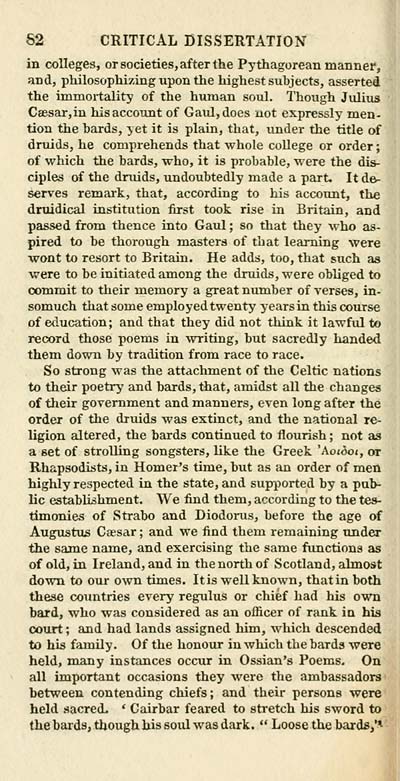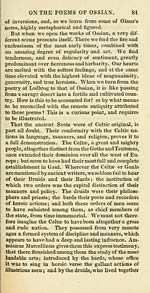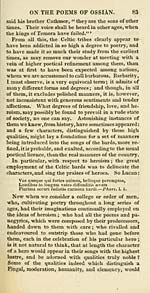Ossian Collection > Poems of Ossian
(90)
Download files
Complete book:
Individual page:
Thumbnail gallery: Grid view | List view

82 CRITICAL DISSERTATION
in colleges, or societies, after the Pythagorean manner,
and, philosophizing upon the highest subjects, asserted
the immortality of the human soul. Though Julius
Caesarjin his account of Gaul, docs not expressly men-
tion the bards, yet it is plain, that, under the title of
druids, he comprehends that whole college or order ;
of which the bards, who, it is probable, were the dis-
ciples of the druids, undoubtedly made a part. It de-
serves remark, that, according to his account, the
druidical institution first took rise in Britain, and
passed from thence into Gaul ; so that they who as-
pired to be thorough masters of that learning were
wont to resort to Britain. He adds, too, that such as
were to be initiated among the druids, were obliged to
commit to their memory a great number of verses, in-
somuch that some employed twenty years ra this course
of education; and that they did not think it lawful to
record those poems in writing, but sacredly handed
them down by tradition from race to race.
So strong was the attachment of tlie Celtic nations
to their poetry and bards, that, amidst all the changes
of their government and manners, even long after the
order of the druids was extinct, and the national re-
ligion altered, the bards continued to flourish ; not as
a set of strolling songsters, like the Greek 'Aoi^oj, or
Rhapsodists, in Homer's time, but as an order of men
highly respected in the state, and supported by a pub-
lic establishment. We find them, according to the tes-
timonies of Strabo and Diodorus, before the age of
Augustus Ccesar ; and we find them remaining under
the sajne name, and exercising the same functions as
of old, in Ireland, and in the north of Scotland, almost
down to our own times. It is well known, that in both
these coimtries every regulus or chief had his own
bard, who was considered as an officer of rank in his
court ; and had lands assigned him, which descended
to his family. Of the honour in which the bards were
held, many instances occur in Ossian's Poems. On
all important occasions they were the ambassadors
between contending chiefs; and their persons were
held sacred. ' Cairbar feared to stretch his sword to
the bards, though his soul was dark. •' Loose the bards,**
in colleges, or societies, after the Pythagorean manner,
and, philosophizing upon the highest subjects, asserted
the immortality of the human soul. Though Julius
Caesarjin his account of Gaul, docs not expressly men-
tion the bards, yet it is plain, that, under the title of
druids, he comprehends that whole college or order ;
of which the bards, who, it is probable, were the dis-
ciples of the druids, undoubtedly made a part. It de-
serves remark, that, according to his account, the
druidical institution first took rise in Britain, and
passed from thence into Gaul ; so that they who as-
pired to be thorough masters of that learning were
wont to resort to Britain. He adds, too, that such as
were to be initiated among the druids, were obliged to
commit to their memory a great number of verses, in-
somuch that some employed twenty years ra this course
of education; and that they did not think it lawful to
record those poems in writing, but sacredly handed
them down by tradition from race to race.
So strong was the attachment of tlie Celtic nations
to their poetry and bards, that, amidst all the changes
of their government and manners, even long after the
order of the druids was extinct, and the national re-
ligion altered, the bards continued to flourish ; not as
a set of strolling songsters, like the Greek 'Aoi^oj, or
Rhapsodists, in Homer's time, but as an order of men
highly respected in the state, and supported by a pub-
lic establishment. We find them, according to the tes-
timonies of Strabo and Diodorus, before the age of
Augustus Ccesar ; and we find them remaining under
the sajne name, and exercising the same functions as
of old, in Ireland, and in the north of Scotland, almost
down to our own times. It is well known, that in both
these coimtries every regulus or chief had his own
bard, who was considered as an officer of rank in his
court ; and had lands assigned him, which descended
to his family. Of the honour in which the bards were
held, many instances occur in Ossian's Poems. On
all important occasions they were the ambassadors
between contending chiefs; and their persons were
held sacred. ' Cairbar feared to stretch his sword to
the bards, though his soul was dark. •' Loose the bards,**
Set display mode to: Large image | Transcription
Images and transcriptions on this page, including medium image downloads, may be used under the Creative Commons Attribution 4.0 International Licence unless otherwise stated. ![]()
| Early Gaelic Book Collections > Ossian Collection > Poems of Ossian > (90) |
|---|
| Permanent URL | https://digital.nls.uk/81238949 |
|---|
| Description | Selected books from the Ossian Collection of 327 volumes, originally assembled by J. Norman Methven of Perth. Different editions and translations of James MacPherson's epic poem 'Ossian', some with a map of the 'Kingdom of Connor'. Also secondary material relating to Ossianic poetry and the Ossian controversy. |
|---|
| Description | Selected items from five 'Special and Named Printed Collections'. Includes books in Gaelic and other Celtic languages, works about the Gaels, their languages, literature, culture and history. |
|---|

